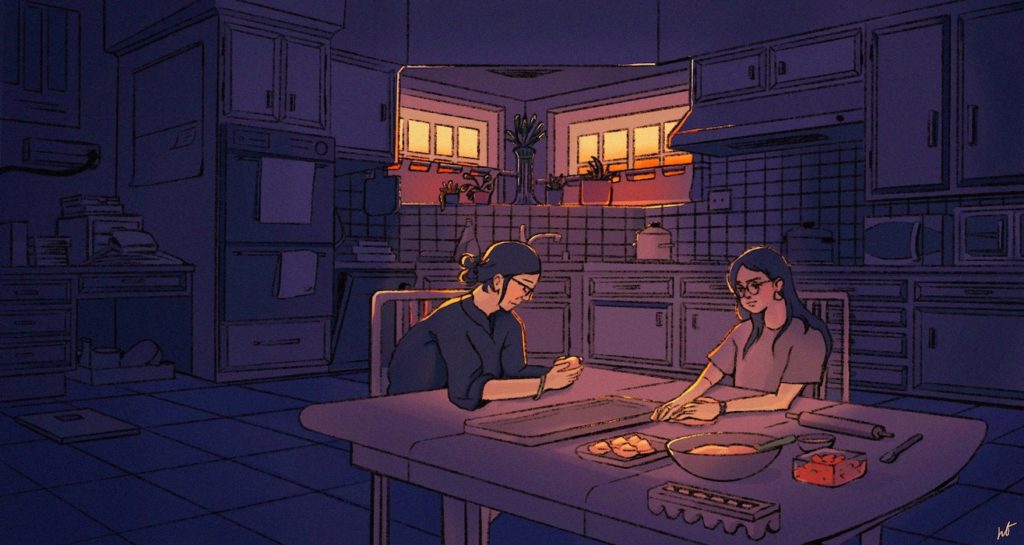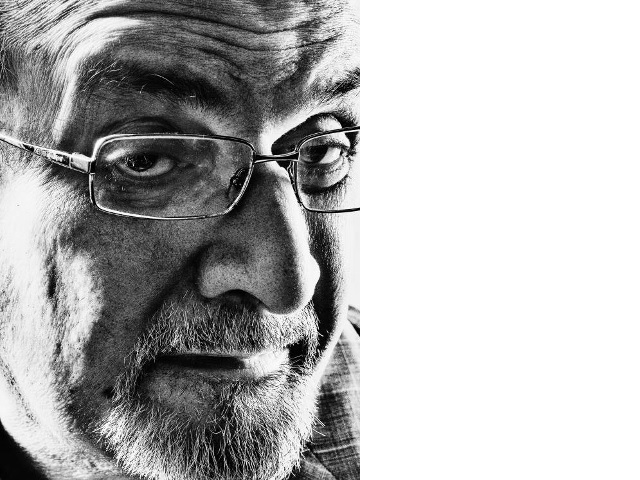I think of the warmth that had once existed under the covers in the narrow space between my parents.

January 19, 2021
When I think of safety, I think of a warm golden orb that surrounds me, embraces me, and holds me. I think of the warmth that had once existed under the covers in the narrow space between my parents. Safety was waking up from a scary dream in my bed and following glowy orange night lights down the stairs into my parents’ bedroom. Safety was climbing into their bed and nestling myself in between them. Safety was their presence that reassured me another world existed beyond my nightmares.
One morning, instead of the sweet morning chorus of birds, I heard sirens and a loudspeaker. My mom went to investigate first, and then my dad followed. I was half-asleep and waited for them until the bed grew cold. When I finally got out of bed, I saw a row of police cars in our driveway and my parents in handcuffs. I was seven then. I was told that the police, these armed strangers in black uniforms, were here to protect the people, to protect us, to protect me.
When I am warm, I am safe—my body is clothed and armored, and I am protected.
My mom, with cold metal around her wrists, asked the officers if she could have some privacy to help me get dressed. Her usual loud and unapologetic self was gravely subdued; instead, she was quiet, small in movement, and unable to meet my gaze. At seven, I had mastered reading my parents’ emotions, and I chose mercy. I held my tongue, a habit that I have never been able to outgrow to this day. I kept my eyes on the inch-wide crack on the door as my mom scrambled to put together an outfit for me, and the air seemed to sting my exposed arms and legs.
My mom picked out jeans, a hand-me-down t-shirt from my brother, and a light khaki jacket. As I waited for the driver from summer camp to pick my brother and me up, I saw my dad one last time through the glass window in the backseat of the cop car. He rolled his shoulders back, a familiar gesture to remind me to look ahead and stand tall. That day was a hot and dry summer day. At summer camp, I never once took off my jacket.
When I am warm, I am safe—it was difficult to leave in the middle of the night, but my mom tried to make it easier by turning on the car seat warmer.
Once every few months, my mom would wake my brother and me up at 2 a.m. so that we could leave the house before 3 a.m. It was disorienting to leave the brightly lit parking garage of our apartment only to plunge into open roads of endless darkness, but I could always count on the heated seat to lull me back to sleep. I’d drift in and out of consciousness, the bluish moonlight never quite leaving my hazy field of vision. I’d wonder if my dad would be awake to see it too… if he was anticipating our arrival so much that he wouldn’t be able to sleep. It was a four-hour car ride to the prison, and it always felt too short. My mom’s Hacken Lee CD would play in the background, repeating the same ten songs throughout the drive. I’ve since learned to associate romantic Cantopop with a sense of comfort and security.
I had learned to feel and recognize the signs of arrival in my sleep—the car would slow down and turn on a roundabout before settling on a parking spot. I’d dread opening my eyes and getting out of the car. The parking lot was filled with other visitors, some driving even for days, to visit their loved ones. At exactly 7 a.m., everyone would get out of their car and rush to get in line to make it into the first round of visitations. Otherwise, they’d have to wait another two hours. The guards would yell, “No running!” but my mom would tell my brother and me to run because we were children, and children would be spared. She was wrong.
One time, I was wearing a striped long sleeve shirt underneath a thick jacket. I had taken off my jacket and shoes, and I was standing before the guards for scrutiny and inspection. The industrial off-white walls and linoleum floors were particularly unwelcoming and cold, and it was insulated very poorly. The guards were all wearing thick puffy jackets. My dad, as if speaking from experience, would tell me during our phone calls to “speak politely to authority” as it would “go a long way.” I think people call this ass-kissing.
The guard told me my long sleeve was too tight, so I followed my dad’s advice. I must not have been polite enough because I still ended up at the giant Walmart just a few streets down. They also opened at 7 a.m., and to shop as soon as they opened was a tell-tale sign that you came from the prison down the street. I’d pick out a shirt two sizes too big from the sale section. I always hid behind my mom, embarrassed to be one of the unlucky visitors who got turned away because of a fitted shirt, and embarrassed to even be visiting a prison at all. I had a theory that the dress code violations supplied a good chunk of that Walmart’s early morning income. Over the years, I’ve accumulated various shirts and jackets from “inappropriate” visiting attire.
When I am warm, I am safe—it was freezing in the visitation room.
We sat on plastic chairs around a low table under the intrusive gaze of patrolling guards. My brother and I took turns going to the vending machine area outside. The only thing we were allowed to bring inside was a clear vinyl pouch to hold loose change. The silver coins felt cold in my hands, but I enjoyed the jingle of a quarter going through the machine. My dad loved the beef jerky and the microwavable chicken breast burgers. I’d wait my turn to microwave my items and would clutch the softened burger to warm my frosty hands.
Outside of obligatory greetings and questions about school, I barely spoke to my dad. He’d speak to me, and I would pretend to be busy balling my fists and twisting my sleeve around it. I was angry. They told me I was “too young” to understand, but what more was there to understand than the fact that my dad was a criminal and our whole family was ashamed and suffering for it? I felt powerful in my anger and in the resentment that embraced me when nothing else would.
At the end of the visitation day, we would get rounded up with the rest of the visitors. My family was usually one of the only families that stayed the whole visitation period. We would pass through multiple barbed wire fences and hallways before being inspected one last time. I’d look at the other visitors curiously. Sometimes, there’d be children younger than me. Other times, my brother and I would be the only children. Often, the visitors would exchange tired smiles to each other while waiting for our role call. In a place so devoid of warmth, there was an unspoken feeling of community amongst the visitors.
When I am warm, I am safe—I write to my penpals from my cozy bedroom with plush carpet and sunlight streaming through the windows, and my penpals write from inside cold and gray cement walls.
Over the past year, I have been corresponding and forging friendships with people on the inside. A few of my penpals tell me things on their bucket list for when they are released, and I share pictures of beautiful sights from my hikes.
My friend, Gabby, is getting released in a few months! She tells me the thing she looks forward to most is stepping on soft carpet after spending the past two decades standing on concrete. Another friend, Kanoa, tells me he is rarely able to see the moon and the stars.
I confide in them buried memories of my dad’s imprisonment, things that I was never really able to share with anyone else. I write from a desire to materially support my penpals, but I feel that they have actually supported me. Though we live in vastly different worlds—one where time seems to fly by and one where every day feels like a millennium—we share similar dreams and hopes for the future.
When I am warm, I am safe—the warm golden orb surrounds, embraces, and holds my penpals, their families, and everyone else locked up in prison.
I tell my incarcerated friends that I can’t wait for them to hike the coast side cliffs and see the sparkling ocean for themselves, to see beyond the endless horizon, to see a free world worthy of them. The safest, warmest place in the world is one where you are embraced and held by your community and one where you are able to live, love, and dream in abundance.
This essay is published as part of A World Without Cages, the Asian American Writers’ Workshop’s ongoing project on The Margins that imagines the end of mass incarceration and migrant detention by bringing together the work of writers on the inside and on the outside. This project aims to nurture writers, activists, and intellectuals to dream new worlds beyond punishment, policing, surveillance, segregation, and exclusion. Read more in the project here.



